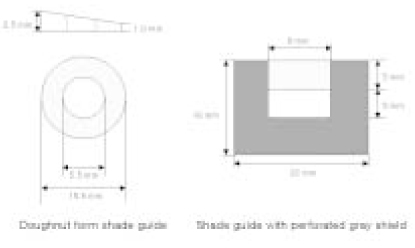J Korean Acad Conserv Dent.
2005 May;30(3):170-177. 10.5395/JKACD.2005.30.3.170.
Influence of the shade guide design on color matching
- Affiliations
-
- 1Department of Conservative Dentistry, College of Dentistry, DSRI, Chonnam National University, Korea. hinso@jnu.ac.kr
- 2Department of Pharmacology and Dental Therapeutics, College of Dentistry, DSRI, Chonnam National University, Korea.
- KMID: 2045242
- DOI: http://doi.org/10.5395/JKACD.2005.30.3.170
Abstract
- This study was conducted in order to assess whether the form of the shade guide affects in deciding the color of the teeth using the shade guide. Eight shade light cured composite resins (Esthet-X, Dentsply, Milford, USA) were used in this study. Shade guides including the model of maxillary central incisors, teeth-form shade guide, doughnut form shade guide, and shade guide with perforated gray shield were prepared with eight shade composite resins and provided the codes randomly. After arranging the models of teeth, 19 dentists working at the clinic of the Dentistry of Chonnam University Hospital and 65 students of college of dentistry, Chonnnam University selected the shade guides corresponding to the color of each tooth on the gray board under the D65 standard illuminant. B1 shade showed highest accuracy of about 95% among all shade guides of 3 forms applied to the test and regardless of observer, tooth form shade guide showed the highest accuracy (p < 0.05), and the doughnut form showed the lowest accuracy (p < 0.05). At the time of deciding on the color of the teeth using the shade guides as a result of above, the forms of the shade guides can affect the accuracy, and it suggests that the development of the diversified forms of shade guides, which may obtain more accurate results, is required.
Keyword
Figure
Reference
-
1. Sproull RC. Color matching in dentistry. Part II. Practical application of the organization of color. J Prosthet Dent. 1973. 29:556–566.
Article2. Miller L. Organizing color in dentistry. J Am Dent Assoc. 1987. (Spec No):26E–40E.
Article3. Lund TW, Schwabacher WB, Goodkind RJ. Spectrophotometric study of the relationship between body color porcelain and applied metallic oxide pigment. J Prosthet Dent. 1985. 53:790–796.
Article4. O'Neal SJ, Powell WD. Color discrimination and shade matching ability of third year dental student. J Prosthet Dent. 1984. 63:174.5. van der Burgt TP, ten Bosch JJ, Borsboom PC, Plasschaert AJ. A new method for matching tooth colors with color standards. J Dent Res. 1985. 64:837–841.
Article6. Kim HS, Um CM, Kahng MW. A Study on Color Differences Between Composite Resins and Shade Guides. J Korean Acad Conserv Dent. 1996. 21:107–120.7. Cho KY, Hwang IN, Choi HR, Oh WM. Comparative Evaluation of Light-cured Composite Resins Based on Vita Shade by Spectrocolorimeter. J Korean Acad Conserv Dent. 1998. 23:424–432.8. Wozniak WT. Proposed guidelines for the acceptance program for dental shade guides. 1987. Chicago: American Dental Association.9. Preston JD. Current status of shade selection and color matching. Quintessence Int. 1985. 16:47–58.10. Hwang IN, Oh WM. Colorimetric Analysis of Extracted Human Teeth and Five Shade Guides. J Korean Acad Conserv Dent. 1997. 22:769–781.11. Cho KM, Shin DH. Color Analysis of The Natural Teeth with a Modified Intraoral Spectrophotometer. J Korean Acad Conserv Dent. 1998. 23:223–235.12. Hwang IN, Lee KW. Translucency of Light Cured Composite Resins Depends on Thickness & Its Influence on Color of Restorations. J Korean Acad Conserv Dent. 1999. 24:604–613.13. Goodkind RJ, Schwabacher WB. Use of a fiber-optic colorimeter for in vivo color measurements of 2830 anterior teeth. J Prosthet Dent. 1987. 58:535–542.
Article14. Johnston WM, Kao EC. Assessment of appearance match by visual observation and clinical colorimeter. J Dent Res. 1989. 68:819–822.
Article15. Barrett AA, Grimaudo NJ, Anuscvice KJ, Yang MCK. Influence of tab and disk design on shade matching of dental porcelain. J Prosthet Dent. 2002. 88:591–597.
Article16. Lee MY, Shin DH. New Evaluation Technique in Teeth Color Using Digital Camera. J Korean Acad Conserv Dent. 1997. 22:325–333.17. Gross MD, Moser JB. A colorimetric study of coffee and tee staining of four composite resins. J Oral Rehabil. 1977. 4:311–322.
Article18. Seghi RR, Hewlett ER, Kim J. Visual and instrumental colorimetric assessments of small color differences on translucent dental porcelain. J Dent Res. 1989. 68:1760–1764.
Article19. Moon EB. Color Systems. 2002. Seoul: Kukjebook;215–271.20. Park EJ. Basic on Color Moulding. 1996. 2nd ed. Seoul: Mijinsa;56–194.21. Methods of Visual Comparison for Object Color. The Korean Industrial Standard. KS A 0061.22. Anusavice KJ. Phillips' science of dental materials. 1996. 10th ed. Philadelphis: Saunders;42.23. Macentee M, Lakowski R. Instrumental color measurement of vital and extracted teeth. J Oral Rehabil. 1981. 8:203–208.
Article24. Farnsworth D. The Farnsworth-Munsell 100-hue and dichotomous tests for color vision. J Opt Soc Am. 1943. 33:568–578.
Article25. Shillingburg H, Hobo S, Whitsett LD, Jacobi R, Brackett SE. Fundamentals of fixed prosthodontics. 1997. 3rd ed. Chicago: Quintessence Publishing Co;437.
- Full Text Links
- Actions
-
Cited
- CITED
-
- Close
- Share
- Similar articles
-
- Effects of eye dominance on shade matching and color perception among the dentist population
- Evaluation of shade guide using digital shade analysis system
- The reproducibility of various porcelain color selection systems using spectrophotometry
- Proposal for a gingival shade guide based on in vivo spectrophotometric measurements
- Color Matching of Single-Shade Composite Resin by Various Pulp Capping Materials in Anterior Teeth




